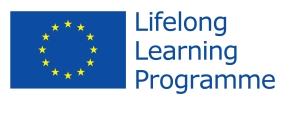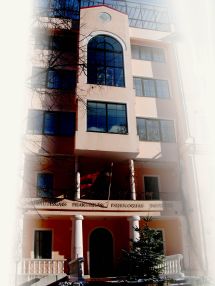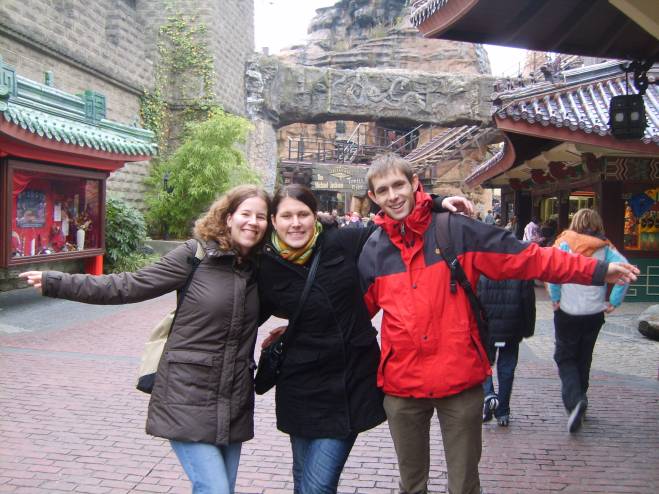
























ERASMUS
You are a student of International Higher School of Practical Psychology and you would like to participate in the student exchange programme
The ERASMUS programme is one of the popular European exchange programmes for teachers and students, established in 1987 and funded by the European Union (www.viaa.gov.lv).
The purpose of the Erasmus programme is to improve the quality of higher education and strengthen its European dimension. It does this by encouraging transnational cooperation between universities, fostering the European mobility of students and teachers, and contributing to improved transparency and academic recognition of qualifications and studies throughout the European Union. International Higher School of Practical Psychology has been participating in the programme since 2003. Over 20 students took the opportunity to study at higher education institutions of Europe, over 15 students and 25 trainers, instructors and teachers visited our higher school.
This programme is available to students of all departments, as well as professional Bachelor’s Degree programme and Master’s Degree programme.
International Higher School of Practical Psychology has signed exchange agreements with a number of European universities: University of Joensuu(Savonlinna, Finland), Lyon University-2 (France), Universityof Cologne(GermanUniversität zuKöln), University of Milan (Italy), Veliko Tarnovo (Bulgaria), etc. In the very near future we are going to expand the list of partnership contacts.
If you are interested in any higher education institutions within the European Union, but we have not signed the exchange agreement with this university yet, you should contact the Department of Foreign Affairs (International Office), so we will try to establish contacts with this university or institution.
ERASMUS GRANT
All students who participate in the Erasmus programme are eligible to receive a grant. Each student is only entitled to one period of Erasmus mobility during the course of their undergraduate studies.
International Higher School of Practical Psychology gives students the opportunities to study for a period of 4-5 months (one semester) at a university or higher education institution in another participating country in the framework of agreed arrangements between universities.
A grant helps you to finance the additional costs related to the studies abroad.
The total amount of grant you shall receive will depend on your host country and on the length of your stay expressed in months. For example, within the academic year 2012-2013 the Erasmus grant of International Higher School of Practical Psychology was 681.44 EURO per month.
ЕСТS
ECTS (European Credit Transfer System) was developed by the Commission of the European Communities in order to provide common procedures to guarantee academic recognition of studies abroad. It provides a way of measuring and comparing learning achievements and transferring them from one institution to another.
Students participating in ECTS receive full credit for all academic work successfully carried out at any of the ECTS partner institutions. These credits are transferred to the home university and fully replace the semester workload.
Each student of International Higher School of Practical Psychology must obtain 30 ЕСТS per 1 semester at the host institution (30 ECTS credits corresponds to 20 Latvian credit points).
CANDIDATE SELECTION PROCEDURE
Students can participate in the Erasmus exchange programme if they have completed at least one academic year of studies and have different level of foreign language proficiency depending on qualifications and specialities (translators and interpreters – B2 level of the first foreign language, A2 level of the second foreign language; other specialities – B1 level and/or A2 level).
HOW TO APPLY FOR THE PLACE ON THE ERASMUS EXCHANGE PROGRAMME?
Documents for ERASMUS students:
- Letter of Recommendation from the trainer/teacher (in foreign languages),
- Application Forms, filled in by the student (forms are sent by the Department of Foreign Affairs (International Office) via e-mails),
- Documents required by the host institution,
- Trilateral agreement among a host institution, a home institution and a student.
5. After obtaining and processing the necessary documents
- a student and an ECTS Coordinator should choose and prepare a list of subjects.
- a final list of subjects will be prepared at the host institution, it should be sent to the Head of the Department of Foreign Affairs.
6. After all examinations are passed, a student should get Transcript of Records.
7. At the end of the stay abroad students must:
- submit the origin of Transcript of Records to the ECTS Coordinator,
- write an article for the newspaper „Restarts” or for the homepage of International Higher School of Practical Psychology about experiences, impressions in foreign institutions,
- present a story about studying abroad, the study process, student life, interesting and curious cases of intercultural communication etc. at the traditional student conference (September or February).
APPLICATION AND DOCUMENT DEADLINES
Obtaining and processing the documents: until Mar 31 for the first semester, until October 15 for the second semester.
Period of studies abroad:
October – December (January) for the first semester (according to the schedule of the host institution)
February - May (June) for the second semester
Intensive Language Courses: August/ January (according to the schedule of the host institution).
CONTACT INFORMATION
Lilita Meiere – SPPA (IHSPP) – ECTS Coordinator:
Rīga, LV-1011, Bruņinieku iela 65, Secretariat (the first floor),
Phone: 67506257,
lingva@sppa.lv
Svetlana Mihailova – Head of the Department of Foreign Affairs (International Office),
Phone: 67803922,
svetlanam@sppa.lv
Ludmila Baranova – Erasmus Coordinator,
Phone: 67506257,
lingva@sppa.lv
sppa@sppa.lv
Irina Balašova – Financial Director (processing documents on grants),
Phone: 67506621,
ak@sppa.lv
ERASMUS TEACHING STAFF PROGRAMME
International Cooperation and ERASMUS
SPPA (IHSPP) has a strategic plan of development of international relations, approved at the meeting of the SPPA Senate.
International contacts are coordinated by the Department of International Affairs, headed by SPPA Erasmus coordinator of the whole institution, the Rector and the President of SPPA.
Each faculty is provided by coordinators who inform academic staff about the possibilities of exchange programmes between higher education institutions, help to prepare the necessary documents.
The Duties of the Department of International Affair of SPPA are
- to search for foreign higher education institutions to sign agreements. These agreements may concern the exchange programme between both students and trainers/teachers in the field of collaborative research, study materials, etc.
- to deal with the financial support within the exchanges reaching staff programmes, which are mentioned in agreements on cooperation between higher education institutions and within the Erasmus exchange programme.
- to host to foreign professors, to provide their accommodation and cultural programme. It also applies to short-term visits of foreign partners from universities and research institutes.
Ground Rules of Conclusion of New Agreements:
Types of Agreements
Erasmus Agreement
- is concluded with theEuropean Union member countries,
- is a student/teachers/trainers/lecturers exchange.
General Agreement
- is concluded with all the countries within or outside the European Union.
- all kinds of activities are available (student exchange, academic staff exchange, joint research programmes, cultural activities, etc.).
- is concluded with the departments of the higher education institutions, as well the higher education institution.
Preparatory Visits
A preparatory visit can be used to find and get acquainted with potential partners and plan the development of the project proposal together. A preparatory visit can be used to discuss cooperation models, roles, define the aims of further cooperation, tasks, responsibilities, plan of activities for the cooperation, and develop a project proposal. The duration of a single visit should normally last up to five days.
Academic Staff Exchange
Members of the academic staff, who wish to complete teaching assignments in foreign partner universities within the Erasmus exchange programme, should submit an application to the SPPA Department of International Affairs. Staff can teach abroad between 4 -7 days. Teaching assignments are funded if the load is not less than 10 academic hours (1 academic hour = 45 minutes).
The agreement specifies the number of lecturers who are planning a working trip to a foreign partner university. A partnership agreement between the higher education institutions between universities facilitates the procedure of academic staff exchange.
Before the visit
During the visit
1. A member of the academic staff should have a document confirming the fact that the programme has been completed. Then the document should be attached to the report on a business trip.
After the visit
Incoming Partners
The Department of International Affairs
1. Provides information about administrative actions (visa, residence permit, etc.)
2. Hosts to guests and helps with accommodation (hotels or apartments)
3. Provides information about the higher education institution, city, and country.
4. Provides an interpreter if it is necessary.
5. Provides a cultural programme.
